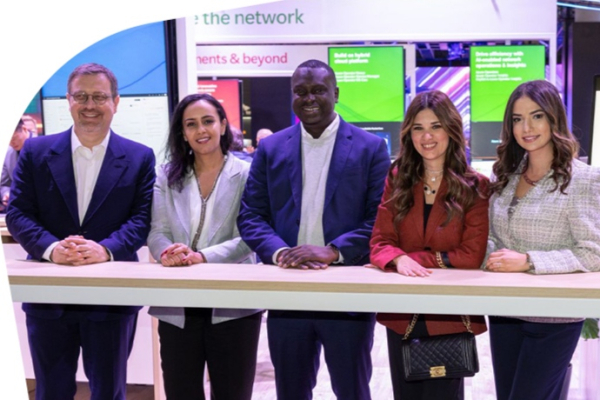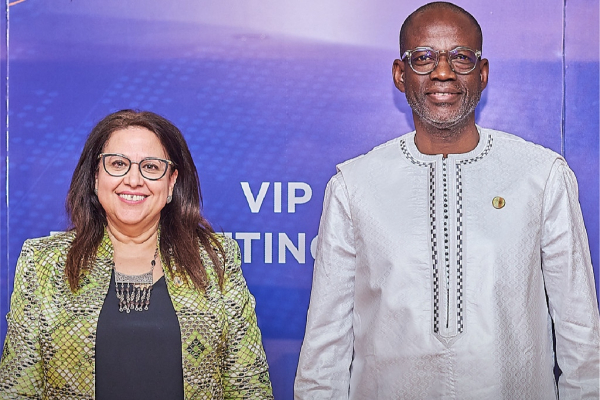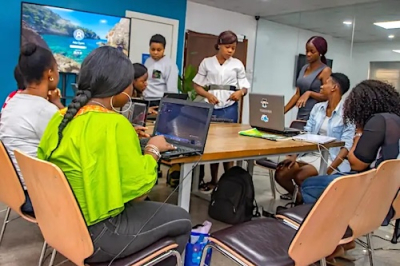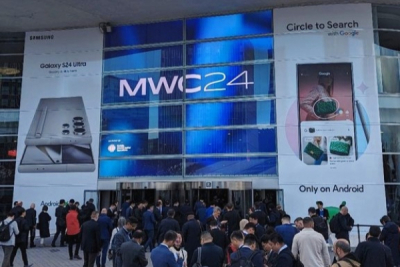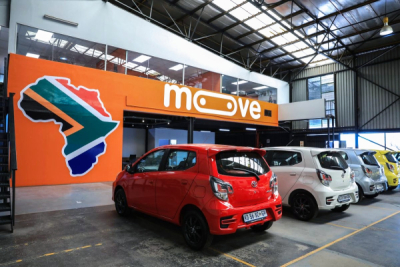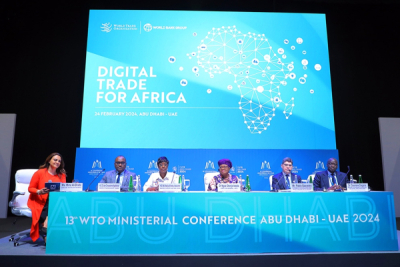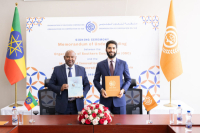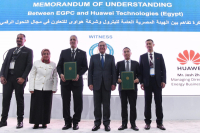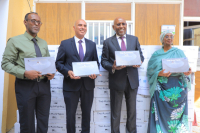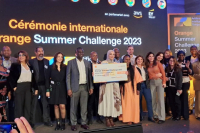
Tech (1147)
The Mobile World Congress opened in Barcelona, Spain, on Monday, February 26, offering an opportunity for technology companies to sign strategic partnerships to support their growth in various regions of the world.
Orange Middle East and Africa and Microsoft signed a Memorandum of Understanding to support digital transformation initiatives in 17 African and Middle Eastern countries. The memorandum was announced, Wednesday, at the Mobile World Congress in Barcelona, Spain.
"This collaboration with Microsoft is a significant step in our commitment to support the digital transformation of African businesses. By combining our network and Microsoft’s solutions, we can provide SMEs with the tools and guidance they need to thrive in the digital economy," said Jérôme Hénique (pictured, left), CEO of Orange Middle East and Africa.
Under that agreement, Microsoft will leverage the Orange network to offer Microsoft solutions such as Microsoft 365, Copilot, Azure, and Dynamics 365 to approximately 15,000 SMEs in 2024 and ultimately to 1 million. The two companies will collaborate on training, marketing, and sales support programs, and establish a steering committee to track progress using performance indicators.
Microsoft, like Orange, continues to invest in the continent. Besides announcing the construction of a new data center in South Africa earlier this month, Microsoft has partnered with several African countries to drive digital transformation. This includes Kenya, where the company will integrate its cloud solutions into public administration e-services, and Nigeria, where it aims to enhance the digital skills of civil servants across various ministries in collaboration with a local partner.
Adoni Conrad Quenum
Africa needs a skilled workforce to effectively achieve its digital transformation. It can count on the World Bank and its partners, committed to supporting its endeavors.
The Smart Africa Digital Academy (SADA) has received a $20 million grant from the World Bank to expand its activities across Africa, as part of the West Africa Regional Digital Integration Program (WARDIP).
The World Bank funding will support a project that expands upon the existing foundations of SADA and the AReg4DT program. It will train a new generation of African policymakers and regulators, equipping them to utilize the potential of green and inclusive digital transformation through innovative approaches to policy and regulation.
"With this aim, the scale-up will reach 30,000 unique policymakers and decision-makers from all African countries, with a targeted participation level of females at 40%. Given the World Bank’s commitment to digital transformation in Africa, the grant will significantly contribute to regional integration and rapid adoption of the Single Digital Market for Africa," says the Smart Africa press release.
This grant builds upon previous World Bank and SADA collaborations aimed at building digital capabilities in Africa. In November 2023, for instance, the World Bank announced $266.5 million in funding for similar purposes and also for internet access expansion and a single West African digital market.
Initially launched by the Smart Africa Alliance with funding of around $30,000, SADA has already made remarkable progress. Since August 2020, it has offered online training for decision-makers and policy-makers, helping to improve digital skills and promote a dynamic learning ecosystem across Africa.
Samira Njoya
To help African women seize opportunities in the technology industry, She Code Africa will be implementing a training program in product development and management. The FedEx-funded program aims to reach 100,000 women by 2030.
She Code Africa, a program dedicated to empowering African women in technology, has announced a partnership with FedEx to launch a tech training initiative. The program is open to women from all African countries who are passionate about technology and are between the ages of 18 and 45.
The program offers two training paths. The first is a 2-3 month engineering pathway that covers a range of essential technical courses, including software engineering (web and mobile), cloud engineering, data science and analytics, and hardware engineering such as robotics. The second track offers comprehensive 2-3 month bootcamps designed to equip African women with the knowledge and skills needed to design and manage products.
Funded by FedEx, the program also provides career mentoring, a one-month paid internship for practical experience, and job opportunities with leading tech companies. The initiative aims to enable African women to leverage the opportunities offered by the tech industry. By 2030, the program aims to train and integrate 100,000 women and girls into the tech industry. Applications are open until March 8.
Vanessa Ngono Atangana
For three days, global telecommunications and technology sector stakeholders will meet to discuss an ever-smart and connected world and exchange insights and innovations.
The Mobile World Congress, in Barcelona, Spain, has drawn nearly 96,000 registrants for this year’s event, which opened on February 26, according to Mats Granryd, Managing Director of the Global System Operators Association (GSMA). This marks an increase from last year’s attendance of approximately 90,000.
The Mobile World Congress 2024 (MWC 2024), officially inaugurated by King Felipe VI, is focusing not only on connectivity but also on all related sectors. "As connectivity brings us together, technology opens possibilities – with connectivity driving a fusion of technology and purpose across all sectors, enabling new possibilities. This week is all about exploring the future's potential for businesses and society," said Mats Granryd.
Artificial Intelligence (AI) is the most prominent segment at this year’s event, with public adoption of generative AI, such as OpenAI’s ChatGPT, gaining traction since its introduction in November 2022. The tech community and governments are currently considering the practical applications, economic implications, ethical use regulations, and safety concerns of generative AI.
Other key topics to be discussed at the event include connected and electric cars, cloud computing, 5G and 6G technology, and the transformation of telecom operators.
MWC 2024 also presents an opportunity to explore the latest tech gadgets, including wrist smartphones, connected watches, laptops, and tablets. Major broadband industry players such as Orange, Vodafone, Telefonica, and China Mobile will be in attendance, along with leading tech companies like Huawei, Samsung, Microsoft, Intel, Amazon, Infobip, and Nokia.
The startup ecosystem is well represented, with a dedicated space for tech entrepreneurs and an African delegation featuring companies like Ghana’s Farmerline, Benin’s FedaPay, and Senegal’s Lafricainemobile.
The event, which concludes on February 29, is expected to foster numerous partnerships for the advancement of global connectivity and digital transformation among private, public, and public-private entities.
Muriel Edjo
Moove Africa, a mobility company operating in six sub-Saharan African markets, is currently in talks with Uber regarding a potential investment. The funding would support Moove Africa's continued expansion across the continent.
Uber Technologies, the American ride-hailing giant, is poised to invest $100 million in African vehicle financing startup Moove, according to a Bloomberg report. The investment is part of a new funding round that could increase Moove’s enterprise value from $650 million to around $750 million.
This funding round follows a recent $76 million financing round that included participation from U.S. asset management firm BlackRock and Emirati investment firm Mubadala Investment Company. Moove aims to use these funds to build the world’s largest technology-enabled financial services platform for mobile entrepreneurs.
Moove, which is already a funding partner of Uber in Africa and India, could see its partnership with Uber strengthened if the $100 million investment is confirmed. This could potentially enable broader vehicle financing on a global scale.
Currently headquartered in Amsterdam, Moove operates in several African cities, including Lagos, Accra, Johannesburg, Cape Town, and Nairobi, as well as in London, Dubai, and three major Indian cities: Mumbai, Hyderabad, and Bangalore.
Samira Njoya
E-commerce growth in Africa is projected to accelerate over the next decade, fueled by the COVID-19 pandemic. To support and sustain this expansion, there is an urgent need for regulatory frameworks.
The World Trade Organization (WTO) and World Bank have launched "Digital Trade for Africa," a project aimed at boosting e-commerce growth and job creation on the continent. The announcement came during the WTO's 13th Ministerial Conference (MC13) in Abu Dhabi last Saturday.
The initiative seeks to address limited digital infrastructure and regulatory frameworks hindering Africa's e-commerce potential, according to WTO Director General Ngozi Okonjo-Iweala. “Digital trade is one of the fastest growing segments of trade in the world today. Young people and women on the African continent have shown that they are able to take advantage of these opportunities. Africa has only 1 percent share of digitally delivered services trade, but I see it as an opportunity for the continent to grab on,” she stated.
The project builds on a July 2023 joint WTO-World Bank policy brief that urged the creation of a regulatory environment conducive to digital trade on the continent.
As part of the project, the WTO and World Bank will support select African countries in developing digital infrastructure, including payment systems, and in addressing barriers to digital trade participation.
The aim is to enable Africa to lift its economy through e-commerce in a context where E-commerce platforms in Africa are forecast to reach $59.18 billion in sales by 2027, up from $32.49 billion in 2022, according to a report by digital economy consultancy TechCabal Insights.
Samira Njoya
In Africa, accelerating digital transformation necessitates tight cooperation among various stakeholders, leveraging their collective knowledge for faster progress.
The Southern Cooperation Organization (SCO) and the Ethiopian Ministry of Innovation and Technology have signed a memorandum of understanding to strengthen their collaboration in science, technology, innovation, and digitization. The agreement, signed on Tuesday, February 20, marks the beginning of a strategic alliance aimed at accelerating digital transformation, enhancing capabilities, sharing expertise, and promoting youth exchange initiatives.
The partnership will establish capacity-building initiatives for the Ministry’s professionals and public servants, leveraging the SCO’s resources and expertise. It will also provide new opportunities for youth through educational programs and scholarships, with a particular emphasis on science and technology disciplines.
This partnership is expected to be a key driver for the advancement of Ethiopia’s digital infrastructure, enhancing public services and strengthening key economic sectors through technology. It represents a significant step towards achieving the nation’s digital roadmap, “Digital Ethiopia 2025,” which aims to digitize over 300 services by 2025.
At the same event, OCS Secretary General Sheikh Manssour Bin Mussallam introduced the Greater South Learning Enrichment Resources Nexus (GreSLERN) digital platform. This open-source digital tool is designed to assist educators in member states and curriculum development centers in implementing a comprehensive and inclusive educational approach.
Samira Njoya
Chinese tech giant Huawei is emerging as the preferred partner for African nations seeking to transition into the digital age. The company is rapidly expanding its strategic alliances with both governments and corporations across the continent.
Wael Lotfy, Chairman and CEO of Enppi, an Egyptian oil and gas company, signed two memorandums of understanding with China's Huawei at the Egypt Energy Show, held in Cairo from Monday, February 19 to Wednesday, February 21. The aim is to boost the transition to digital, green energy.
"We consider Huawei a major partner in providing the latest solutions, digital technologies, and modern smart solutions to accelerate the pace of digital transformation in the energy sector, and enhance the production of digital and green energy, in line with the strategic goals of the energy sector with Egypt’s 2030 vision," said Wael Lotfy.
The first document was initialed with Huawei Egypt Digital Power Business, the Egyptian subsidiary of the Chinese supplier of digital power products and solutions, which will provide integrated energy solutions such as low-carbon data centers and photovoltaic power solutions. The second memorandum of understanding was signed with Huawei's local subsidiary, to stimulate the digital and technological transition among Enppi's projects by merging the expertise and smart technologies offered by the Chinese company.
The transition to clean energy is an important component of the development process. It is important to take this variable into account, and these new arrangements will enable Egypt to significantly reduce its greenhouse gas emissions in the power and oil sectors.
Adoni Conrad Quenum
Djibouti is preparing to conduct its third population census, 15 years after the last one in 2009. The government and its partners are working hard to ensure that this first digital census is carried out under the best possible conditions.
On Thursday, Feb. 22, Djibouti’s Institute of Statistics INSTAD received a donation of 1,400 tablet devices from Egypt's government. These new tools are crucial for preparing the upcoming digital population census in the nation, aiming to enhance efficiency in data collection and management.
Djibouti's Institute of Statistics (INSTAD) received a donation of 1400 tablets from Egypt on Thursday, aiding its preparations for the upcoming nationwide digital census.
"These tablets will enable us to carry out our 2.0 census," said INSTAD Director Ibrahim Abdi Hadi, emphasizing the equipment's importance for efficient data collection and storage.
The donation underscores the ongoing partnership between Egypt and Djibouti. It also aligns with Djibouti's commitment to improving data quality for sustainable development and its goal to leverage technology for national progress. The digital census aims to modernize operations and position Djibouti as a regional leader in demographic statistics.
Samira Njoya
Telecommunications giant Orange Group, operating in 18 countries across Africa and the Middle East, is ramping up its efforts to accelerate digital transformation through technology competitions. These initiatives aim to support promising projects and foster innovation in its markets.
Jordanian healthcare technology startup OptiGuide emerged victorious at the first international Orange Summer Challenge (OSC) grand finale on Tuesday, February 20.
The competition saw national winners from eleven African and Middle Eastern countries compete for the top prize, awarded during a ceremony organized by Orange Middle East and Africa (OMEA) in Casablanca, Morocco.
OptiGuide's six-member team impressed the jury with their proposal: an intelligent assistance bracelet designed for the visually impaired. This assistive technology, paired with an AI-powered mobile application, improves user safety by providing real-time identification of obstacles and potential dangers.
The OSC is a three-month internship program organized by Orange Digital Centers. Young talents compete by proposing technological projects within various sectors, aligned with a specific theme. This year's theme, "Artificial Intelligence and the Internet of Things: a winning duo to meet tomorrow's challenges," attracted 253 participants across the region with a total of 46 innovative tec projects proposed, tackling challenges in sectors like environment, health, education, and agriculture. Notably, all participants had access to Orange Digital Centers, free-access infrastructures offering training and support for those seeking to develop their digital skills or pursue digital career paths.
Adoni Conrad Quenum
More...
Recognizing the critical need for collective action, African nations are increasingly forming partnerships to combat the growing threat of cybercrime. Stakeholders from both the public and private sectors are joining forces to strengthen defenses and create a safer digital environment across the continent.
The African Criminal Police Agency (AFRIPOL) and cybersecurity specialist Group-IB signed a memorandum of understanding on Tuesday to bolster collaboration against cybercrime across the continent.
AFRIPOL Acting Executive Director Jalel Chelba (photo, right) hailed the agreement as empowering "African countries to tackle cybercrime with greater effectiveness and efficiency, thereby boosting confidence in the African cyberspace."
Under the partnership, Russian firm Group-IB will share its expertise in cyber investigations, reverse engineering, and incident management with AFRIPOL personnel throughout Africa.
Joint initiatives will focus on cyber threat monitoring, fraud, phishing prevention, tracking compromised payment details, and raising awareness.
The move underscores both parties' commitment to strengthening cybersecurity in Africa, a region estimated to lose $3.5 billion annually to cyberattacks, according to a June 2023 report by US consultancy Kearney. The report also highlighted the region's low cyber resilience level.
Samira Njoya
While venture capital funding in Africa's technology sector was down in 2023 compared with 2022, local initiatives are being put in place to give fresh impetus to the sector, which remains attractive.
Egyptian venture capital firm Sawari Ventures announced plans to launch a $150 million fund dedicated to financing Egyptian startups, aiming to revive the country's tech ecosystem amid a broader funding slowdown.
The announcement, made on Monday by co-founder Hani Al Sanbati, highlights Sawari's commitment to investing in sectors with potential growth, including fintech, edtech, healthtech, green tech, and deep tech. The firm has already supported over 500 startups across the Arab world since its inception in 2010.
This initiative comes at a critical juncture for African tech funding, with investments declining across the continent, including in Egypt, one of the region's most established ecosystems. According to Partech Africa's "2023 Africa Tech Venture Capital" report, Egyptian startups raised $433 million in 2023, a 45% drop from the previous year.
Adoni Conrad Quenum
Morocco has made significant progress in its digital transformation. In a bid to better cater to its population, the government has enlisted the support of the United States, a leading nation in digital development.
A Moroccan delegation led by Sarah Lamrani, Secretary General of the Ministry of Digital Transition and Administration Reform, recently concluded a week-long visit to the United States aiming to strengthen digital cooperation.
The visit, initiated by the US Trade and Development Agency (USTDA), saw delegations meet with executives from around 20 US technology companies and local startups, including IBM, Microsoft, and Google Cloud Services. Discussions focused on potential partnerships in fields like e-government, cloud computing, and cybersecurity.
"The goal was to explore collaborations with American companies to develop and strengthen our digital ecosystem," stated Lamrani. It aligns with the country’s 2030 digital strategy, which is currently being finalized.
The Moroccan delegation presented the key goals of their digital transformation plan, highlighting achievements in areas like human capital development through collaborations with companies like Microsoft and Oracle. They also highlighted opportunities for US companies seeking expansion in emerging markets.
This visit builds upon the existing relationship between the US and Morocco in the information and communication technology (ICT) sector. US companies have already played a significant role in contributing to Morocco's digital development.
Samira Njoya
In a move to address challenges posed by ride-hailing apps like Uber and Bolt, Ghanaian authorities are launching a dedicated app for traditional taxi drivers, aiming to offer a competitive alternative and provide support to this established sector.
Ghana's "Tap N' Go" app, aiming to formalize and integrate the informal transport sector, officially launched on Monday, February 19, following an announcement by Vice President Mahamudu Bawumia.
Available on iOS and Android, the app caters to both users and drivers. Users can book rides from private cars or traditional metered taxis, while drivers receive alerts when their services are requested. This two-sided approach addresses user preferences and offers traditional taxi drivers a platform to compete.
The launch reflects the rapid digitalization of Africa's transport sector, driven by rising on-demand mobility applications. According to Partech Africa data, African mobility startups secured $48 million in 2023 alone. Statista projects "Ride-hailing & Taxi" sales on the continent to reach $4.13 billion in 2024.
"The launch of this app," said Nana Nimako Asiamah, National Chairman of the Ghana Private Road Transport Union (GPRTU), during December's testing phase, "is a timely intervention to save our business." Before its official launch, Tap N' Go underwent trials in several Accra neighborhoods, including the Airport, East Legon, and Dansoman.
Adoni Conrad Quenum


